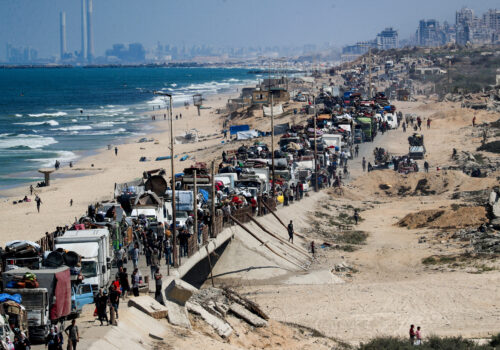How a UN Security Council resolution could help end the war in Gaza
Can the United Nations (UN) Security Council play a useful role in ending the war in Gaza? It would be easy to conclude that it will not. After all, Israel strongly objects to any major UN role in postwar Gaza—unsurprisingly, given the UN’s previous hostility toward Israel, the failure of UN peacekeepers in southern Lebanon, the ways Hamas benefited for decades from UN aid to Gaza, and the delays for renewals for existing UN mandates caused by Security Council politics. And while earlier versions of a postwar plan by former British Prime Minister Tony Blair called for the UN Security Council to oversee the process, the twenty-part plan for Gaza that the Trump administration unveiled this week makes no mention of a role for the UN. At Monday’s White House press conference, led by US President Donald Trump and Israeli Prime Minister Benjamin Netanyahu, the UN received only criticism. Both leaders appeared content with no role for the Security Council in Gaza.
However, there is one way the Security Council could help Gaza achieve a lasting peace: a one-time-only, nonrenewable resolution authorizing an international transitional governing authority and security force—modeled on Security Council Resolution 1031 (1995) for Bosnia.
Why a resolution
Since the July 29 New York Declaration, which brought Arab and European states on board with requiring Hamas’s disarmament, a broad international consensus that includes Israel and the United States has emerged. This consensus holds that the Gaza war needs to end in a way that protects Israel’s security, frees the hostages, disarms Hamas, increases humanitarian aid, and begins Gaza’s physical and social reconstruction. Divisions remain over a future Palestinian state and the role of the Palestinian Authority in Gaza, but paragraph 19 of the Trump peace plan recognizes that those issues will take years to resolve whereas ending the war in Gaza cannot wait.
Supporters of the UN would like to see it play a role. But even the UN’s strongest supporters must acknowledge that the UN has problems with peacekeeping when great powers and major blocs disagree on fundamentals. The UN has other major problems as well: weak mandates, insufficient funding (often caused by the United States), UN staffing rules, and annual renewals of Security Council mandates held hostage to permanent members’ vetoes. Most critically, UN bodies tend to compromise on issues when decisive action is needed. Postwar Gaza will need decisive action, especially to prevent Hamas from undermining Gaza’s physical and social reconstruction.
A well-crafted Security Council resolution could help give legitimacy to the Gaza International Transitional Authority (GITA) in ways that Israel, the United States, and other countries should welcome. First, a Security Council resolution under Chapter VII of the UN Charter would have the force of international law, which would strengthen GITA’s authority in dealing with Hamas, Iran, and anyone else who would try to obstruct Trump’s peace plan.
Second, for many governments, a resolution will unlock financial and other support for GITA and its mission. This funding is vitally important, as one of the most important lessons of Iraq and Afghanistan is that fast and cheap reconstruction always fails.
Third, the resolution could require—not just call for—Hamas’s disarmament, and it could authorize GITA, its International Security Force (ISF), and ISF-contributing states to use what Chapter VII refers to as “all necessary means” to enforce Hamas’s disarmament. Instead of Hamas being the so-called resistance to Israel, Hamas would be exposed as the obstacle to Gaza’s reconstruction and to a better life for Gaza’s 2.1 million people. This could create a fundamentally different political dynamic in Gaza. Opinion polling shows that hundreds of thousands of Gazans would prefer to rebuild their lives without Hamas and under the security of international protection. If successful, GITA would lead eventually to civilian rule by non-Hamas Palestinians—even Israel’s August 8 principles call for this outcome. But the resolution must give GITA and the ISF the strength and authority they will need.
To make a Security Council resolution workable, the United States should take the lead, working with Israel and other allies, to draft a one-time-only authorization for GITA. I was part of a group of former senior US officials who drafted the Plan for Postwar Gaza, released in May 2024 and updated in September 2025, which explains how this should work. The model is Security Council Resolution 1031, adopted on December 15, 1995, after US Ambassador Richard Holbrooke brokered the Dayton peace agreement to end wars in the Balkans that had killed more than 100,000 people. The resolution established the Office of the High Representative (OHR) and an international stabilization force (dubbed “IFOR” then “SFOR”) but did not put them under any further UN oversight. The authorization did not expire or need reauthorization or renewal, hence it is “one-time only.” There were some initial missteps, but OHR and SFOR hit their stride, particularly under the leadership of Paddy Ashdown, high representative for Bosnia from 2002 to 2006. The Balkans today are far from perfect, but they have not been at war for more than twenty years. Security Council Resolution 1031 helped make that possible.
If Russia, China, or other countries block a strong, well-crafted resolution, there are alternatives, as we described in Plan for Postwar Gaza. Another option—which the United Arab Emirates used in its postwar plan—is for the Palestinian Authority to agree in writing that GITA should administer Gaza. A third option is for Israel to take responsibility for Gaza as an Occupying Power under international law (as the United States did for Iraq in 2003) and then transfer its authority to GITA pursuant to a memorandum of understanding. A fourth option is for a group of nations, including the United States, Israel, Arab states, European nations, and others, to draft a charter for an International Contact Group to which GITA would report. This would qualify as a regional security arrangement under Chapter VIII of the UN Charter. The charter would be deposited with the United Nations. While not as powerful as a Chapter VII resolution, regional security arrangements have been recognized as legitimate since the end of World War II.
How to secure Gaza from Hamas
Hamas has previously claimed that it would turn Gaza’s governance over to Palestinian technocrats, but the real obstacle to peace is Hamas’s refusal to give up its weapons in the face of international insistence from Arab and Western governments that the group be permanently disarmed. But Hamas today is no longer the force it was before its attack on Israel on October 7, 2023. Today it is reduced to hit-and-run raids on Israeli patrols. Most of Hamas’s experienced military leaders have been killed and its weapons factories destroyed. Hamas replaced seasoned cadres with inexperienced young men, many of whom fight now so they and their families will be fed and cared for by Hamas while most Gazans suffer.
In Gaza, as in Bosnia in the 1990s, security and reconstruction must be linked. GITA’s mandate needs to stipulate that in neighborhoods where Hamas keeps its weapons, there will be no reconstruction and no security. Hamas remnants will continue to hold out in pockets of Gaza, and Israeli forces will continue to go after them in those pockets. There will be no reconstruction where GITA and the ISF are not in control. In other neighborhoods, people are exhausted and want peace with a political path forward that GITA can bring. A significant percentage of Gaza is, or soon will be, secure enough for GITA and the ISF to take over governance, security, aid, and reconstruction.
If an international security force does materialize, then Hamas may try to test the international community’s will to see if this governing force is as weak as the Palestinian Authority was in 2007. When Hamas found weakness at that time, it forcibly seized power in Gaza, threw opponents off buildings, and took over Gaza’s economy and institutions. Do address the current situation, the civilian and military leaders of GITA and its security component will need to have the determination, as OHR and IFOR had in Bosnia twenty-nine years ago, not to be driven away by armed thugs with Kalashnikovs and improvised explosive devices. Securing Gaza from Hamas is the key to building a lasting peace.
A critical mass of world leaders have said how important it is to end the war in Gaza, protect Israel’s security, and provide for Gaza’s physical and social reconstruction. To see this happen, these leader should back a well-crafted, one-time-only Security Council resolution to help end the cycle of wars between Israel and Hamas.
Thomas S. Warrick is a nonresident senior fellow with the Scowcroft Center for Strategy and Security and the Scowcroft Middle East Security Initiative in the Middle East Programs at the Atlantic Council. From 1997 to 2007, he served in the US Department of State on Middle East and international justice issues, including heading postwar planning on Iraq in 2002-2003.
Further reading
Tue, Sep 23, 2025
Dispatch from 2,200 feet over Gaza: What I learned from airdropping desperately needed food aid
New Atlanticist By Ahmed F. Alkhatib
The head of Realign For Palestine, an Atlantic Council project, joined a recent humanitarian flight over the Gaza Strip that delivered much-needed food to Palestinians.
Thu, Aug 21, 2025
Israel’s Gaza City operation will leave it more isolated. It’s time for a course correction.
New Atlanticist By Jonathan Panikoff
An operation to take Gaza City would mark a dramatic escalation in the conflict—and one with potentially irreversible costs to Israel’s alliances and reputation.
Thu, Sep 18, 2025
Are Arab nations going to impose real costs on Israel?
New Atlanticist By Gina Abercrombie-Winstanley
Arab and Islamic leaders recently met in Doha to discuss Israel’s strike against Hamas leaders in the Qatari capital. It might mark a turning point in regional diplomacy toward Israel.
Image: A meeting of the UN Security Council in New York City on September, 23, 2025. (Credit: IMAGO/AA via Reuters Connect)


